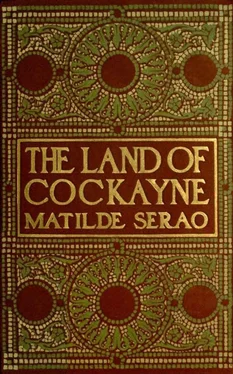Matilde Serao - The Land of Cockayne
Здесь есть возможность читать онлайн «Matilde Serao - The Land of Cockayne» — ознакомительный отрывок электронной книги совершенно бесплатно, а после прочтения отрывка купить полную версию. В некоторых случаях можно слушать аудио, скачать через торрент в формате fb2 и присутствует краткое содержание. Жанр: unrecognised, на английском языке. Описание произведения, (предисловие) а так же отзывы посетителей доступны на портале библиотеки ЛибКат.
- Название:The Land of Cockayne
- Автор:
- Жанр:
- Год:неизвестен
- ISBN:нет данных
- Рейтинг книги:3 / 5. Голосов: 1
-
Избранное:Добавить в избранное
- Отзывы:
-
Ваша оценка:
- 60
- 1
- 2
- 3
- 4
- 5
The Land of Cockayne: краткое содержание, описание и аннотация
Предлагаем к чтению аннотацию, описание, краткое содержание или предисловие (зависит от того, что написал сам автор книги «The Land of Cockayne»). Если вы не нашли необходимую информацию о книге — напишите в комментариях, мы постараемся отыскать её.
The Land of Cockayne — читать онлайн ознакомительный отрывок
Ниже представлен текст книги, разбитый по страницам. Система сохранения места последней прочитанной страницы, позволяет с удобством читать онлайн бесплатно книгу «The Land of Cockayne», без необходимости каждый раз заново искать на чём Вы остановились. Поставьте закладку, и сможете в любой момент перейти на страницу, на которой закончили чтение.
Интервал:
Закладка:
Margherita sat near the door, at a respectful distance. Bianca Maria said the first prayers, the Mystery, and half of the Pater Noster; Margherita said the other part. The same with the Ave Marias: the first part Bianca Maria said; Margherita took it up and finished it. They prayed in a low tone, but one could easily distinguish the voices, always taking up their part of the prayer in time. At every ten Ave Marias, or Stations of the Rosary, they piously crossed themselves, and bent their heads low in reverence to the Holy Ghost at every Gloria Patri.
Thus, between mystical absorption in prayer, the natural emotion these familiar, but poetical supplications aroused, and the sound of her own voice, the girl forgot for a little the great drama developing round her father. The whole Rosary was said thus, slowly, with the piety of real believers. Before beginning the Litany to the Virgin she knelt at her chair, with her elbows on the seat, and the maid knelt in her corner. The girl invoked the Virgin in Latin, with all the tender names her devotees use, and the servant answered 'Ora pro nobis.' But from the beginning of the Litany a rising sound of voices reached from the drawing-room. This noise disturbed Bianca Maria's prayers. She tried not to listen to it by raising her voice more; but it was impossible now to abstract herself from that clash of voices getting excited and angry.
'What can it be?' she said, stopping in her intercessions.
'It is nothing,' said Margherita. 'They are speaking about lottery numbers.'
'They seem to me to be quarrelling,' Bianca Maria timidly replied.
'They will make friends again on Saturday evening,' Margherita muttered, with her commonplace philosophy.
'How so?' the girl asked, letting herself be drawn into the discussion.
'Because none of them will win anything.'
'Let us pray,' said Bianca, raising her eyes to the ceiling, as if gazing on the starry firmament.
It was impossible now to finish the Litany. The discussion in the drawing-room had got so warm, they heard it all, the voices coming near and going off, as if the Cabalists had risen from the table and were walking up and down again, with the need excited people have of going backwards and forwards and round about.
'Shall I shut the door?' asked Margherita.
'Shut it; we are praying,' Bianca Maria said resignedly.
The voices did not come in so distinctly. They could follow the Litany to the end without interruption. But the girl's mind was no longer in the words she was saying. She was quite distracted, and hurried through the finishing Salve Regina as if time pressed.
'The Madonna bless your ladyship!' said Margherita, getting up after crossing herself.
'Thank you,' the young girl answered simply, sitting down again beside her bed, where she spent so many hours of the day thinking and reading.
Margherita had left the door open as she went away. Now the voices burst out angrily. The enraged Cabalists argued furiously with each other, each one boasting loudly of his own way of getting lottery numbers, his own researches, his own visions, each one trying to take the word from the other, interrupting, screaming louder, being interrupted in turn.
'You don't believe in Cifariello the cobbler's talent?' Marzano the lawyer shouted with the white fury of very gentle, good-natured people. 'Perhaps because he is a cobbler, and perhaps because he writes out his problems with charcoal on a dirty bit of white paper! Here it is, here it is! Twenty-seven has come out second instead of fourth, but it came out! Here is eighty-four, that turned round and became forty-eight, but it did come out! Here is the ambo made up of fourteen and seventy-nine I was so unlucky as to give up playing; it came out three weeks after I gave it up. These are facts, gentlemen—facts, not words!'
'They are the sixty francs a month you give him to leave off cobbling and work out numbers for you!' Dr. Trifari interrupted sharply.
'Cifariello is ignorant, but sincere; he gave me fourteen and seventy-nine, and I did not go on with it.'
'Father Illuminato gave me fourteen and seventy-nine, too,' Dr. Trifari retorted, 'but it was the right week.'
'And you won without letting your friends know?' the Marquis di Formosa asked excitedly.
'I won nothing. I divided it into two different tickets. I did not understand what a fortune Father Illuminato was giving me. He is the only one that knows numbers. He holds our fortunes, our future, in his hands. It is a queer thing. When I felt his pulse to see if he had fever, I went trembling all over.'
'Father Illuminato is an egotist!' Professor Colaneri hissed out in a sarcastic, biting voice.
'You say that because he turned you out of his house one day. You tried to get the numbers out of him by force. He won't give them to priests who have thrown off the habit. Father Illuminato is a believer.'
'I see the numbers myself!' Colaneri called out shrilly. 'It is enough for me to take no supper the night before, when I go to bed, and to meditate an hour or two before sleeping: then I see them, you know.'
'But they don't come out right!' shouted the Marquis di Formosa.
'They don't come out right because my mind is clouded by human interests; because I can't free myself from a longing to win; because one must have a pure soul, lay aside disturbing passion, raise one's self into the region of faith, to see clearly. I see them, but often, almost always, a malignant spirit darkens my sight.'
'Look here,' said Ninetto Costa, the smart, rich stock-broker, loudly. 'I have done more. I knew that a young woman, a milliner that lives in Baglivo Uries Lane, had the name of giving good numbers. She can't play them, as you know; they can't do so without losing the power. But she gives them. I made up to her, pretended to fall madly in love with her, gave her presents. I see her morning and evening. I have even got to promising her marriage.'
'Has she given you any?' the Marquis di Formosa asked anxiously.
'Nothing yet. She changes the subject, when I mention it, timidly; but she will give them—she will.'
How Bianca Maria wished that the Rosary she had recited so absent-mindedly was still going on, so as not to hear this mad talk, that she caught every word of! It made her brain reel, as if her soul was drawn into a whirlpool. How she would have liked not to hear the ravings of their disturbed brains so set on one idea! Now the Marquis di Formosa was speaking resoundingly.
'The cobbler's simple science, Father Illuminato's saintliness, our friend Colaneri's dazzling visions, are all very well; but what is the result? What comes of it? We who play our collar-bones every week, drawing money from stones, all of us, winning in a hundred years or so a wretched little ambo, or, worse still, one single number. Stronger hands are needed! a higher strength is needed! We need miracles, gentlemen. We must induce my sister, the nun, to give lottery numbers. My daughter must get her to do it. We need my daughter herself, an angel of virtue, kindness, and purity, to pray to the Supreme Being for numbers!'
A deep silence followed these last words. The entrance-door bell rang. Bianca Maria, shaking all over, dragged herself to her door-curtain and saw a wretchedly-dressed man pass, mean-looking, with pale, red-streaked cheeks, the beard like a hospital convalescent's. It was a painful, alarming vision. In spite of the extraordinary man going into the room, the silence was unbroken, as if the unknown had brought in a mysterious tranquillity.
Bianca Maria strained her ear anxiously, leaning on the door-post. Perhaps the Cabalists had gone back to their little table, taking the new arrival with them. The silence lasted a long time. Motionless, almost rigid, she clutched at the doorposts, not to fall; what she had heard was so sad and cruel it broke her heart. She was seized with humiliation and anguish, as if she could feel nothing but this sorrow. She suffered every way in her natural pride and outraged maidenly reserve, and from her father throwing her name about in a mad dispute. She felt ashamed for him and for herself, as if he had boxed her ears in public. Her anguish nearly suffocated her; it rose to her brain, and seemed to burn her in its hot embrace. How long she stood, how long the silence went on in the drawing-room, she could not tell; only, through her distress, she heard her father's friends pass behind her curtain and go out cautiously, like so many conspirators. Then, mechanically, she left her room to look for him. But the drawing-room was dark, so was the study, where the Marquis di Formosa sometimes consulted an old book of necromancy. Bianca Maria searched anxiously for her father. In the end a light guided her. The Marquis di Formosa had gone into the little chapel, filled up the lamp before the Virgin, and lighted the lamp before the Ecce Homo, put out by his orders, also the two wax candles in the candelabra, and set them before Jesus Christ. Not satisfied with that, he had carried the big lamp into the little chapel. In that illumination he had thrown himself down despairingly before Christ, trembling, shaking, sobbing. Praying aloud, he said to the Redeemer:
Читать дальшеИнтервал:
Закладка:
Похожие книги на «The Land of Cockayne»
Представляем Вашему вниманию похожие книги на «The Land of Cockayne» списком для выбора. Мы отобрали схожую по названию и смыслу литературу в надежде предоставить читателям больше вариантов отыскать новые, интересные, ещё непрочитанные произведения.
Обсуждение, отзывы о книге «The Land of Cockayne» и просто собственные мнения читателей. Оставьте ваши комментарии, напишите, что Вы думаете о произведении, его смысле или главных героях. Укажите что конкретно понравилось, а что нет, и почему Вы так считаете.












